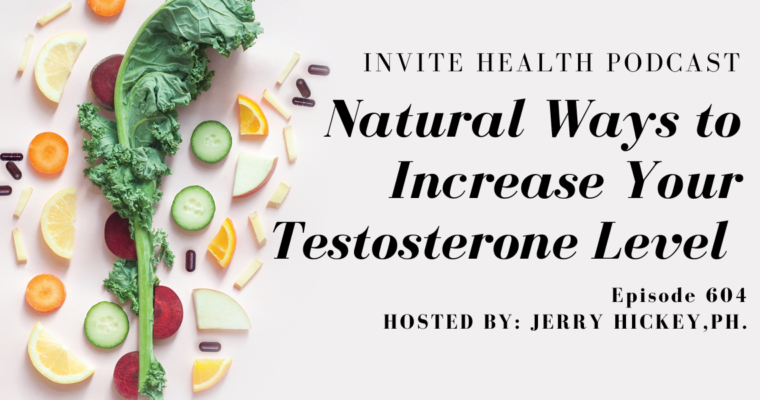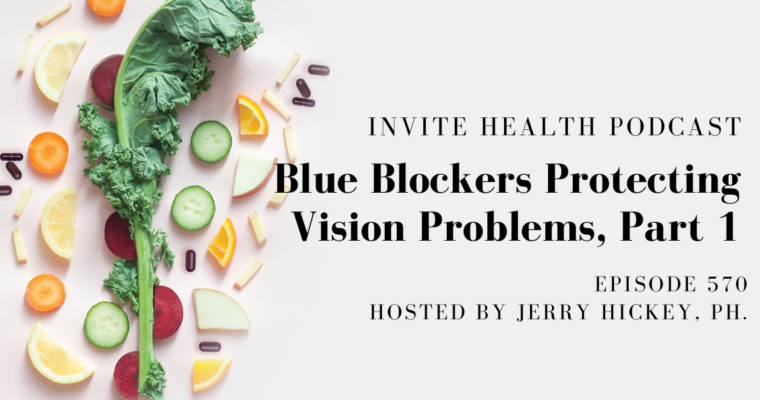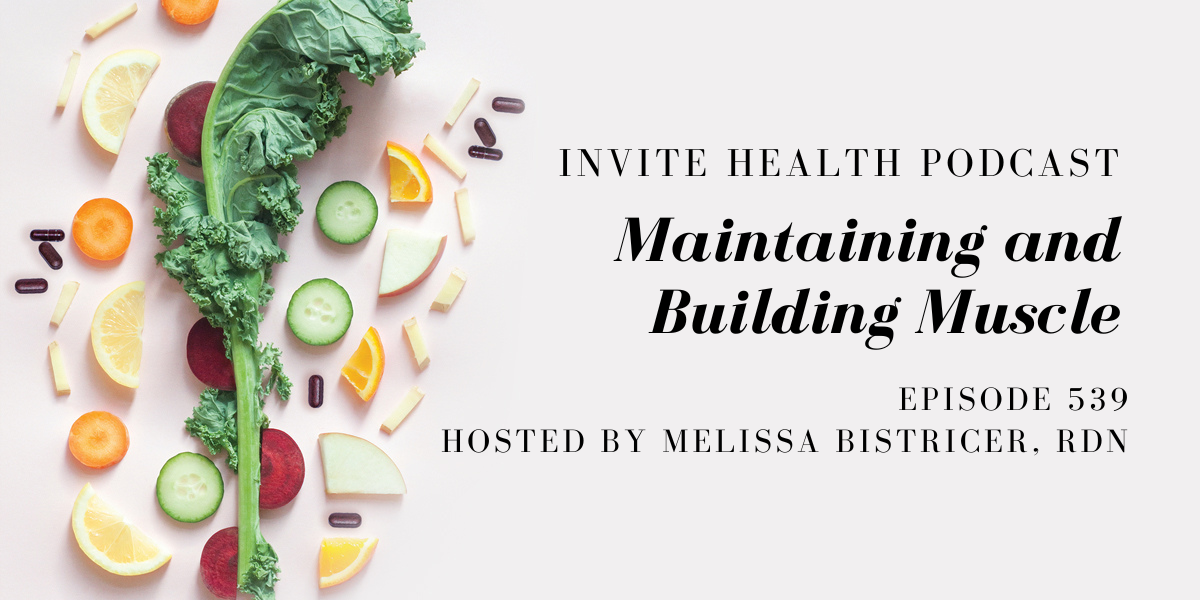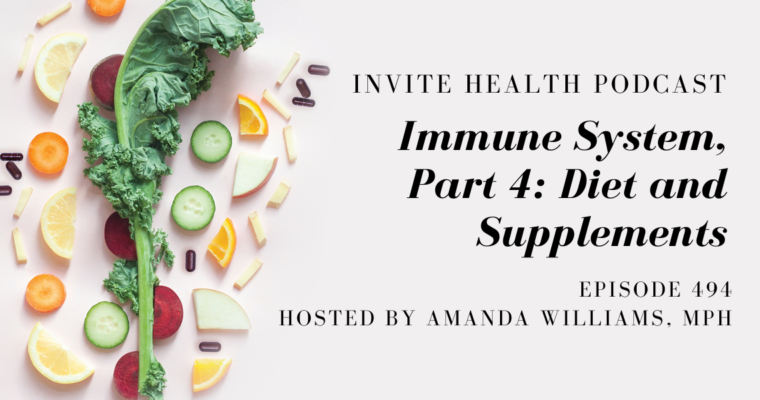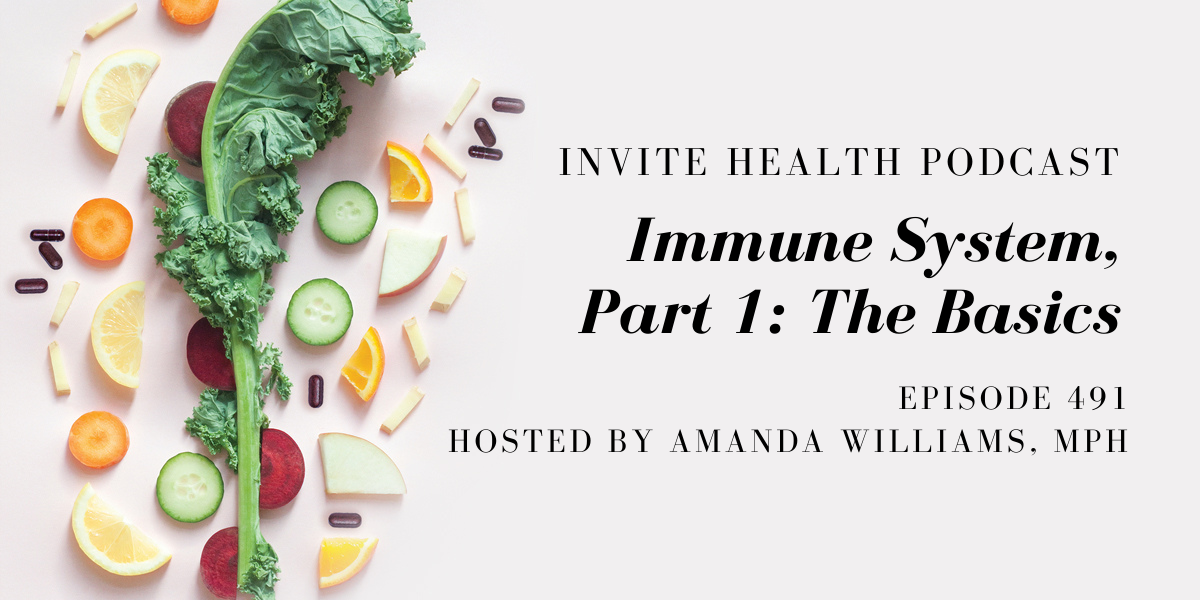immune system
Subscribe Today!
Please see below for a complete transcript of this episode.
Immune System, Part 1: The Basics – InViteⓇ Health Podcast, Episode 491
Hosted by Amanda Williams, MPH
*Intro music*
InViteⓇ Health Podcast Intro: [00:00:04] Welcome to the InViteⓇ Health Podcast, where our degreed healthcare professionals are excited to offer you the most important health and wellness information you need to make informed choices about your health. You can learn more about the products discussed in each of these episodes and all that InViteⓇ Health has to offer at www.invitehealth.com/podcast. First time customers can use promo code PODCAST at checkout for an additional 15% off your first purchase. Let’s get started! [00:00:34]
Amanda Williams, MPH: [00:00:40] Over the past couple of years, you have probably heard and learned more about the immune system than you could have ever imagined. I want to break down the immune system itself and talk about the different aspects and the roles that impact our health, because I think it’s important to have a full foundational understanding. Of course, we’re not going to all become immunologists, but at the end of the day, it’s, it’s key to really understand how it is that our body reacts and responds under certain conditions and when we’re exposed to different pathogens, for example. So I thought I would break this down into multiple podcasts for you so we can look at the relevant actions that our immune system goes through in order to, to keep us healthy. And then what we can be doing on our part to make sure that we age gracefully and that we are doing everything in our power to maintain a healthy lifestyle to boost up our immune defenses.† [00:01:52]
[00:01:53] So I’m Amanda Williams, MD, MPH and the way that I’m going to approach this is I’m going to talk today predominantly on what the immune system actually is. And then in part two, I’m going to look more specifically at what happens just through the aging process. So it’s something actually termed as immunosenescence. I’m going to talk about immunosenescence in part two and then in part three, I want to look at what happens when we have autoimmune issues because everyone has probably heard about autoimmune diseases. And it’s interesting that this can be in a chronic disease or a progressive setting, but it can also be in more of an acute setting, too. So I want to talk about autoimmunity and really look at the difference between passive and active immunization and how the, the body is reacting. So that’ll be in part three. And then in part four, I want to jump into the different nutrients and why it is that certain vitamins and minerals and other key things like probiotic, colostrum, for example, and why our diet really makes such a difference when it comes to supporting our immune defenses.† [00:03:13]
WHY COLOSTRUM SHOULD BE PART OF YOUR IMMUNE SYSTEM ARSENAL – INVITE HEALTH PODCAST, EPISODE 142. Listen Now>>
[00:03:14] But let’s just get right to it. Let’s talk about what exactly the immune system is. And as I mentioned, this can be, you know, very complex when we get into the nitty gritty of immunity and understanding that the immune system itself is basically referring to a collection of different cells and proteins that function to protect us from different foreign antigens, for example, or pathogens, as we oftentimes refer to them. And we know that the main goal of the immune system is to protect our bodies against infection and disease. Now, it’s an integrated system of different cells and tissues and organs that all have these important specialized roles in defending us against these pathogenic microorganisms. So when we think about things like bacteria and viruses, parasites, fungi, for example, but we also know that the immune system is really integral to the way that our cells divide. So even when we think about bad cellular division in the setting of cancer, for example, we know the immune system is a guardian to try to protect ourselves from this.† [00:04:30]
[00:04:31] Now all of these different actions that occur have to happen in this very synergistic effect. And understanding the way that these cells and the immune system is working is essential to this. So we know that there are two major components when we look at our immune system, and this is just kind of broadly speaking. We have our innate immunity and we have our adaptive immunity. So what the innate immunity is is that first line of defense against any type of foreign substance or pathogenic microorganism that our bodies are exposed to, whereas the adaptive, this is, hence the name adaptive, it’s adapting over time. So this is a more delayed immune system response. And it’s key to understand the difference between these two because primarily when we think about the innate immunity, this is when we have this recruitment of these different immune cells to the site of a injury or an infection, so where you have inflammation or an infection.† [00:05:49]
[00:05:50] Now this is driven up through cytokines. Now we know that the cytokines, these are the primary thing that we often think about when we think about inflammation. For example, if you’ve heard me talk about this before on the radio, I talk about, you know, cytokine storms and the release via, you know, COX-1, COX-2, the 5-lox pathway, arachidonic acid. So there’s different ways in which cytokines, leukotrienes, prostaglandins are all released. So when we think about the innate immunity, this is kind of in that, that realm that we are thinking about. We think about the innate immune system as having things such as our skin, the physical barriers of our body to try to keep us protected. When we think about the acidity within the gastric juices, for example. These are all ways that we can look at the innate immune system. It’s that initial response. It’s the skin trying to protect us. It’s the gastric juices trying to kill off anything that we may ingest. So all of these things are very important.† [00:07:06]
[00:07:07] Now, seeing the way that the innate immune system is working, this is what really gives us that initial response to any type. So say you get, you know, exposed to a cold, a rhinovirus, for example. It is that innate immunity that drives all of this up. When we think about our macrophages, when we think about neutrophils, these are very, very important immune cells that help to digest any of those invading microorganisms. And that process is actually called phagocytosis. So, like I said, the immune system itself… Very complicated. I love it. I think it’s one of the most interesting forms of really understanding science and studying the human body. And the more that we’re learning now about the immune system, it’s just so impressive. So, so we have the innate immune system, and we know that through this innate immunity, we are able to stave off a lot of the initial foreign pathogens. So this is a quick, rapid response is what we consider the innate. It’s an immediate.† [00:08:34]
[00:08:35] And then we have that delayed. So that’s the adaptive immune system. Now this is that next level of defense. And what we know through the adaptive immune system, being that this is delayed, that this is where our antibody-mediated immunity or our cell-mediated immunity comes into play. So this is when we think about our B cells, our helper T cells, our cytotoxic T cells. All of these fall into that category of the adaptive or the delayed immune response. We also consider this to be acquired immunity. So it’s the second line of defense. This can take several days. This can take weeks to fully develop. It really depends on what that actual exposure to a specific antigen is, that’s whatever is invading the body is what is going to determine the length of time for the acquired immunity to kind of kick in.† [00:09:37]
[00:09:38] So all of these things are working synergistically together. Now what’s very interesting about this is that every single part of the immune system, we’re thinking about the immune cells and whether it be innate or we’re thinking adaptive is highly reliant on different macronutrients, micronutrients, which is why if we have nutritional deficiencies, if we are not getting the right nutrients from our diet, this can weaken our immune defenses. Now, oftentimes we don’t talk about this enough. We just automatically turn towards, you know, OK, you have a bacterial infection. We’re going to give you antibiotic. And of course, that’s going to be the primary line of treatment. But the key thing is, is how do we stop that from even beginning in the first place?† [00:10:30]
[00:10:30] Now the way that we do that is by strengthening up our immune system. Having a good, healthy gut. This is so integral that to understand that 70% of our immune system is located within the intestines. So if we have chronic inflammation that’s occurring within our GI tract, this is going to compromise the integrity of that mucosal barrier, which makes us more vulnerable to all sorts of infections. So whether we’re thinking about a GI infection specifically or if we’re looking at a respiratory illness because at the end of the day, it is that driving force coming from our intestines that allows us to have this ability to drive away the potential negative effect of different pathogenic agents.† [00:11:37]

[00:11:39] Now we know that the micronutrients really come into play here when we’re thinking about all those B-vitamins. When we think about Vitamin A, Vitamin E. Most of the time when people think of their immune system, they think of zinc and they think of Vitamin C. But we have to have all of these different components. We have to have those dietary fatty acids, those omega-3 fatty acids. These are certainly integral to our immune defenses, both innate and adaptive. So our macronutrients, our micronutrients, incredibly important, and we can start to look at how each individual vitamin and mineral and fatty acid is actually working, how they’re helping to activate different genes.† [00:12:31]
[00:12:32] For example, Vitamin A is a key one to to look at this when we think about our generation of antibody responses to a specific antigen. Vitamin A is really key to this. So when we think about our adaptive immune system, Vitamin A now… Well, I guess we oftentimes focus so much on Vitamin C, but Vitamin A is very important for this, so not to go too heavy into each individual vitamin and mineral… We know Vitamin D clearly much more than just for bone health. We have to understand how Vitamin D is integral to the immune system response and the transcription of multiple different genes in the body that help with the activation of both the innate and the adaptive immune system responses. And then, of course, when we look at something like Vitamin C, we know that Vitamin C definitely is working along that pathway of both the innate and the adaptive. So a lot of different moving parts and all of these have to be working efficiently in order for our body to be able to react and respond accordingly to anything that may be trying to invade us or to attack us.† [00:14:00]
[00:14:01] Now, to look more specifically at the different defense barriers that we have in the system… I had mentioned the physical barriers, thinking about the skin, thinking about our gastric juices, but we also have to think about the, you know, temperature regulation in the body. So we have, you know, pH, so the acidity of the body. We think about the temperature of the body. This is why when we get sick, oftentimes the body will start to heat up. So that fever response is to try to naturally kill off… So while a fever is never fun, that’s the body’s way through that innate immune system. So that’s a perfect example of the innate immune system saying, “Hey, something bad has happened. We need to cook this thing.” So this is just an example of those different defensive barriers that our wonderful innate immune response is actually doing for us.† [00:15:08]
[00:15:09] And then looking further down the road when we get into that delayed immune response, we’re looking at the adaptive. This is where the science gets really very interesting because now we’re dealing with these antibodies, we’re dealing with B cells, we’re dealing with T cells. We have these MHC complexes, so this is the major histocompatible complexes. So this is all very, very detailed and it just shows why when we think about different illnesses, whether it’s a virus, whether we’re thinking about, you know, COVID, whether we’re thinking about influenza, whether we’re thinking about Staphylococcus aureus or, you know, Bacillus cereus infections in the body that so many different moving parts are working to keep us healthy. And it really is. It’s so incredibly impressive to think that we are designed this way, that we have these different immunoglobulins that all have these specific purposes. You know, we have IgE, which we know helps with the response within mast cells and histamine. We have IgA, which releases secretory IgA, for example. So we have all of these different immunoglobulins. You can look say, for example, if you had an exposure to, let’s just say, hepatitis, this is one of the ways that they track, is they look for the immunoglobulin response because remember, this is that delayed response. So I get incredibly excited about this because when it comes to immunopathology, I find it so interesting just to see how this simple little cell in the body can be doing all of these many different functions to communicate with this other simple little cell in the body to make sure that we can still exist, that a particular virus or parasite or bacteria isn’t getting into our system and taking us over.† [00:17:22]
COVID-19 RESEARCH RECOMMENDS VITAMIN D SUPPLEMENTATION – INVITE HEALTH PODCAST, EPISODE 251. Listen Now>>
[00:17:23] But it’s not just limited, as I mentioned, to to these different pathogens. You know, we can think about chronic inflammation. We can look at the autoimmune component and I’m going to talk about that in another podcast, talking about what is autoimmunity and why does this occur? And what triggers that? So all of these things are so interesting to, to study and to really have a good foundational understanding of. So seeing how much research as far back as probably the last two decades is really focused in on the microbiota. So understanding how the microbiome, those trillions of bacteria that inhabit our bodies, how those are actually working to communicate with our immune cells to help to keep us healthy. And so that’s why if you have an unhealthy gut, you are basically weakening your immune system. And I’m also going to talk about the immune system in aging and in that setting of immunosenescence and why that matters, why we have to make sure that we’re taking in the right nutrients, that we’re doing the right things when it comes to our lifestyle to enhance our body’s ability to fend off any of these potential problems that can certainly arise.† [00:18:52]
[00:18:53] So at the end of the day, we know that we have this immediate response called the innate immunity, and then we have this delayed response that’s called adaptive immunity. We know that within that, we have the requirement of all of these different vitamins and minerals and fatty acids that play an integral role into the way both the innate and the adaptive immune system are working on our behalf. So while immunology in and of itself and immunopathology and understanding all of these different things is just its own field of medicine. So we’re not all trying to be immunologists today, but what we do want to understand is the complexity of the human immune system and why we should not just take it for granted that, you know, if we catch a cold, no big deal, because oftentimes it is no big deal. The immune system can respond. But if we’re doing things to make our immune system weaker, then it is a big deal because we want to be able to respond in the most appropriate and efficient way possible. So understanding the immune system is key to understanding what we can be doing moving forward throughout our lives to make sure that our immune system is not going through this weakening process that is brought on by ourselves.† [00:20:33]
[00:20:34] So I’m going to talk in the next podcast about the aging immune system, and specifically it is called immunosenescence. I’m going to talk about immunosenescence, what that means to our overall immune defenses, what we can do when it comes to restoring that and maintaining a more favorable immune defense mechanism. So there’s a lot to the immune system. I can only cover so much when it comes to really getting into the science behind it because it is, I said, it’s its own field of medicine and research, and it takes years and years to really fully understand the interrelation between how these different cells and how these different micro and macronutrients are all working synergistically together.† [00:21:32]
[00:21:33] So that is all that I have for you for today. Do make sure that you tune in to part two where I will talk about immunosenescence and the aging immune system. I want to thank you so much for your continued support of InViteⓇ Health. And remember, you can find all of our episodes for free wherever you listen to podcasts or by visiting invitehealth.com/podcast. Now, do make sure that you subscribe and you leave us a review. You can follow us on Facebook, Twitter and Instagram @invitehealth and we will see you next time for another episode of the InViteⓇ Health Podcast.† [00:21:33]
*Exit music*


